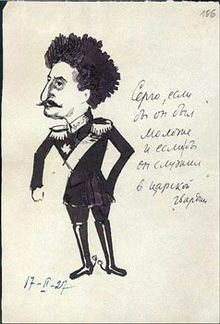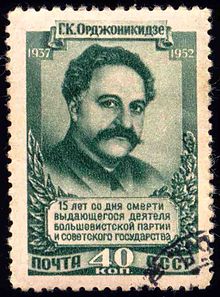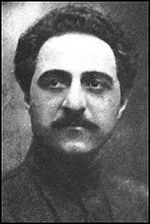- Grigory Ordzhonikidze
-
Grigol Ordzhonikidze (Georgian: გრიგოლ (სერგო) ორჯონიკიძე - Grigol (Sergo) Orjonikidze, Russian: Григо́рий Константи́нович Орджоники́дзе, generally known as Sergo Ordzhonikidze (Серго́); October 24 [O.S. October 12] 1886 – February 18, 1937) was a Georgian Bolshevik, later member of the CPSU Politburo and close friend to Joseph Stalin. Ordzhonikidze, Stalin and Anastas Mikoyan comprised what was jokingly referred to as the "Caucasian Clique."
Contents
Biography
Early life
Born in Kharagauli, western Georgia to a Georgian noble family,[1] Ordzhonikidze became involved in radical politics in 1903, and after graduating as a doctor from the Mikhailov Hospital Medical School in Tiflis, was arrested for arms smuggling. He was released and went to Germany, but in 1907 returned to Russia and settled in Baku where he worked closely with Stalin and others. Sergo is now believed by historians to have been involved in the 1907 assassination of Prince Ilia Chavchavadze, a prominent Georgian poet and intellectual.[2] Sergo also participated in the Persian Constitutional Revolution on a mission by the Bolshevik party and stayed in Tehran for a while around 1909.[3]
He was arrested for being a member of the Social Democratic Party and deported to Siberia, but managed to escape three years later. He returned with Stalin to St. Petersburg in April 1912, but again was apprehended and sentenced to three years hard labour. For a time he served on the collegium of the new Cheka. During the course of the Russian Civil War, he became a commissar for the Ukraine and took part in fighting against the White Army of Anton Denikin in the Caucasus. Appointed chairman of the Caucasian Bureau of the Russian Communist Party in 1920, he was instrumental in the incorporation of the Caucasus in the nascent Soviet Union. After Azerbaijan and Armenia had been taken over by the Bolsheviks, in 1921 Ordzhonikidze led a Bolshevik invasion of the Democratic Republic of Georgia and established the Socialist Republic of Georgia.[4] Later, he fought to reduce Georgian autonomy from the Russian SFSR and hence became a key figure involved in the Georgian Affair of 1922.[5] During the same period, he also aided Mirza Koochak Khan in establishing the short-lived Socialist Republic of Gilan in northern Iran.[6]
 Sergo Ordzhonikidze if he was younger and served in the tsarist guard, cartoon by Nikolai Bukharin, 1927
Sergo Ordzhonikidze if he was younger and served in the tsarist guard, cartoon by Nikolai Bukharin, 1927
Politburo member
Ordzhonikidze was appointed to the Politburo in 1926, and became Commissar of the Soviet Heavy Industry in 1932.[7] According to historian Roy Medvedev, Ordjonikidze opposed the purges of Stalin, Lazar Kaganovich and Nikolai Yezhov and the arrest of his deputy in the Commissariat of Heavy Industry, Georgy Pyatakov.[8] Historian Oleg Khlevniuk has found no evidence in Soviet archives that suggests Ordzhonikidze disagreed with the Moscow Trials, including the arrest, conviction, and execution of Pyatakov. According to them, Ordzhonikidze questioned Pyatakov personally, and was convinced of his guilt. He drafted a speech for the February-March 1937 Central Committee Plenum that left no doubt of his determination to uproot saboteurs like Pyatakov from his commissariat. There allegedly exists a copy of the speech, which was delivered to the Plenum by Molotov after Ordzhonikidze's death. In general, Khlevniuk maintains that Ordzhonikidze may have been a soft Stalinist but a Stalinist nonetheless.[9]
Death
Ordzhonikidze died during the night of February 17-18 1937. His death was ruled the result of a heart attack. On February 19, Pravda published a report signed by three doctors and by the People's Commissar for Health Grigory Kaminsky, affirming that Ordzhonikidze "died of paralysis of the heart."[10]
The story that Ordzhonikidze committed suicide was first mentioned by Nikita Khrushchev during his Secret Speech of February 25, 1956. Khrushchev made this claim again in his speech to the 22nd Party Congress in 1961. In his memoirs Khrushchev gives two contradictory sources for this story: Anastas Mikoyan, who supposedly told him after the war, and Georgy Malenkov, who supposedly told Khrushchev about this during the war itself.
Roy Medvedev reports a rumor that Ordzhonikidze's files and papers were later confiscated by Lavrentiy Beria, and that Ordzhonikidze's bodyguards and personal secretary, along with his brothers Ivan and Konstantin, were also arrested.[8] In fact his brothers were arrested, but at different times and apparently unrelated to Ordzhonikidze's death. The possibility remains that his death had been ordered by Stalin.[11]
Legacy
 Grigory Ordzhonikidze on a 1952 Soviet Union postage stamp.
Grigory Ordzhonikidze on a 1952 Soviet Union postage stamp.
Several towns and districts in the USSR were renamed Ordzhonikidze after him, such as Vladikavkaz in Russia and Vahdat in Tajikistan. Sokol plant, the main producer of MiG fighters, was named in honour of Sergo Ordzhonikidze, as well as the Moscow Aviation Institute (MAI).
References
- ^ Montefiore, Simon Sebag (2004). Stalin: The Court of the Red Tsar. New York: Knopf. p. 123. ISBN 1-4000-7678-1.
- ^ Montefiore, Simon Sebag (2007). Young Stalin. New York: Knopf. p. 179. ISBN 1-4000-9613-8.
- ^ Gregor Yaghikiyan, Showravi va jonbesh-e jangal (The Soviet Union and the Jungle Movement) (Persian), Editor: Borzouyeh Dehgan, Tehran: Novin, 1984.
- ^ Montefiore. The Court of the Red Tsar, p. 123.
- ^ Figes, Orlando (1998). A People's Tragedy: The Russian Revolution: 1891–1924. New York: Penguin Books. pp. 798–799. ISBN 0-1402-4364-X.
- ^ Ebrahim Fakhrayi, Sardar-e Jangal (The Commander of Jungle) (Persian), Tehran: Javidan,1983.
- ^ Service, Robert (2003). A History of Modern Russia: From Nicholas II to Vladimir Putin. Cambridge, Massachusetts: Harvard University Press. p. 194. ISBN 067401801X.
- ^ a b Medvedev, Roy A (1971). Let History Judge: The Origins and Consequences of Stalinism. New York: Knopf.
- ^ Khlevniuk, Oleg (1995). In Stalin's Shadow: The Career of "Sergo" Ordzhonikidze. New York: M.E. Sharpe.
- ^ Montefiore. The Court of the Red Tsar, p. 213.
- ^ Service. A History of Modern Russia, p. 219.
Aleksandr Miasnikyan • Grigoriy Ordzhonikidze • Mamia Orakhelashvili • Rukholla Akhundov • Vissarion Lominadze • Mamia Orakhelashvili • Lavrentiy Beria Categories:
Categories:- 1886 births
- 1937 deaths
- Bolsheviks
- Central Committee of the Communist Party of the Soviet Union members
- Politicians from Georgia (country)
- History of Soviet Georgia
- Old Bolsheviks
- People buried in the Kremlin Wall Necropolis
- People of the Russian Civil War
- Politburo of the Central Committee of the Communist Party of the Soviet Union members
- Russian Social Democratic Labour Party members
- Russian revolutionaries
- Suicides in the Soviet Union
- Revolutionaries who committed suicide
- Georgian Communist Party communists
Wikimedia Foundation. 2010.

